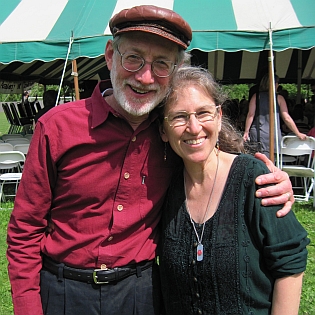 Why do you stay in the marriage?
Why do you stay in the marriage?
An acquaintance recently asked my husband this question. He asked it not because my husband had expressed any unhappiness with our marriage, but because I have Asperger’s.
How do I begin to explain all the ways in which this question hurts?
Let’s start with the assumption that my husband must be unhappy in our marriage, despite the fact that we are both quite delighted to be married to each other. It’s rather common for disabled people to hear others make that assumption. It’s an assumption based on the notion that disabled people are a trial and a tribulation to those who love us. So I knew, at that moment, that I wasn’t alone. It was somewhat comforting to know I wasn’t alone, but mostly, it was very painful to know that I wasn’t alone, and that so many of us still go through these experiences.
And then, there is a stereotype at work here, an assumption that people with Asperger’s are all alike, and that we make relationships difficult simply by virtue of being autistic. Somehow, when one partner has Asperger’s, generalizations replace specifics, and the idea that relationships are a two-way street, in which each party can be a challenge to the other, gets lost.
While I was still reeling from having heard the question, only one answer came to mind, and it was the answer I was hoping my husband had given:
Because I love her.
It’s not the one he gave. I was disappointed at first. When someone implies something negative about me, I immediately go to the place of wanting my husband to profess his love for me, in a very loud and declamatory voice, from the nearest rooftop.
But now I’m glad he didn’t give that answer. Simply saying that he loves me runs the risk of implying that he stays in the marriage not because of what I bring, but out of something akin to heroism. It ignores the ways in which I ground his life, in which I nourish his heart, in which I support him in all of his struggles. It has the potential to reinforce the notion that, because of my disability, I am a burden that he carries with saintly patience. And it suggests that he should have to profess his love for me, rather it simply being a given, as it should be for any husband and wife.
So he didn’t say he loved me. Instead, this is what he said:
Because it works for me.
It’s a brilliant answer. It really is. It takes the entire conversation out of the realm of disability and into the realm of why anyone stays in a marriage. You stay because it works for you. It may be hard work sometimes, and it may be a rocky road sometimes, but that’s marriage. Certainly, you also stay because you love the other person, but that’s not enough to keep a marriage going. Lots of people who love each other break up because the marriage stops working for one or both of them, and because there is nothing that anyone can do to fix it.
So yes, my husband is married to me because it works for him. And I am married to him because it works for me. Each of us can be a trial to the other at times, but the same is true for any two married people. We are not married despite the challenges each of us puts in the path of the other, but because of them. They help us to grow, to love, and to understand life in ways that we could never begin to do without the other.
Rachel Cohen-Rottenberg blogs at Journeys with Autism, and presides at Autism and Empathy.
The Perfect Answer appears here by permission.
The most recent installment in Rachel Cohen-Rottenberg’s published memoirs is Blazing My Trail.
[image from original post]
Rachel Cohen-Rottenberg on 12/9/11 in featured, Society | No Comments | Read More

